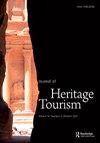遗产地情感可达性的认知评价视角:来自联合国教科文组织世界遗产地佩特拉的经验证据
IF 2.2
Q2 HOSPITALITY, LEISURE, SPORT & TOURISM
引用次数: 1
摘要
迄今为止,对遗产体验的情感方面的研究仍然不足,这些遗址的情感可达性被忽视。本研究运用认知评价理论(CAT)和反转理论,评估动机、旅游影响、情感可达性和感受情绪对遗产地游客满意度的影响。基于1531名前往佩特拉的国际游客的样本,本研究证实,游客动机影响感知到的积极旅游影响,而不是消极旅游影响。游客动机对游客从现场访问中获得的情感(情感可达性)有积极的作用。然而,只有积极的旅游影响对情感可达性有贡献,后者反映了感受到的积极情绪和消极情绪。这些因素与游客满意度之间存在显著的相关关系。对文化可持续性和遗产地旅游体验管理的启示提出建议。本文章由计算机程序翻译,如有差异,请以英文原文为准。
A cognitive appraisal perspective of emotional accessibility at heritage sites: empirical evidence from the UNESCO World Heritage Site of Petra
ABSTRACT The emotional aspects of heritage experiences remain so far under-researched with the emotional accessibility at such sites ignored. Using cognitive appraisal theory (CAT) and reversal theory, this study evaluates the role of motivation, tourism impacts, emotional accessibility, and felt emotions in determining tourist satisfaction at heritage sites. Based on a sample of 1531 international visitors to Petra, this study confirms that tourist motivation affects perceived positive but not negative tourism impacts. Tourist motivation contributes positively toward visitors accessing their emotions (emotional accessibility) derived from the site visit. However, only positive tourism impacts contribute to emotional accessibility, and the latter informs both felt positive and negative emotions. Significant relationships exist between these factors and tourist satisfaction. Implications for cultural sustainability and tourist experience management at heritage sites are suggested.
求助全文
通过发布文献求助,成功后即可免费获取论文全文。
去求助
来源期刊

Journal of Heritage Tourism
HOSPITALITY, LEISURE, SPORT & TOURISM-
CiteScore
6.50
自引率
11.10%
发文量
39
期刊介绍:
The Journal of Heritage Tourism ( JHT ) is a peer-reviewed, international transdisciplinary journal. JHT focuses on exploring the many facets of one of the most notable and widespread types of tourism. Heritage tourism is among the very oldest forms of travel. Activities such as visits to sites of historical importance, including built environments and urban areas, rural and agricultural landscapes, natural regions, locations where historic events occurred and places where interesting and significant living cultures dominate are all forms of heritage tourism. As such, this form of tourism dominates the industry in many parts of the world and involves millions of people. During the past 20 years, the study of tourism has become highly fragmented and specialised into various theme areas, or concentrations. Within this context, heritage tourism is one of the most commonly investigated forms of tourism, and hundreds of scholars and industry workers are involved in researching its dynamics and concepts. This academic attention has resulted in the publication of hundreds of refereed articles in various scholarly media, yet, until now there has been no journal devoted specifically to heritage tourism; Journal of Heritage Tourism was launched to fill this gap. JHT seeks to critically examine all aspects of heritage tourism. Some of the topics to be explored within the context of heritage tourism will include colonial heritage, commodification, interpretation, urban renewal, religious tourism, genealogy, patriotism, nostalgia, folklore, power, funding, contested heritage, historic sites, identity, industrial heritage, marketing, conservation, ethnicity, education and indigenous heritage.
 求助内容:
求助内容: 应助结果提醒方式:
应助结果提醒方式:


